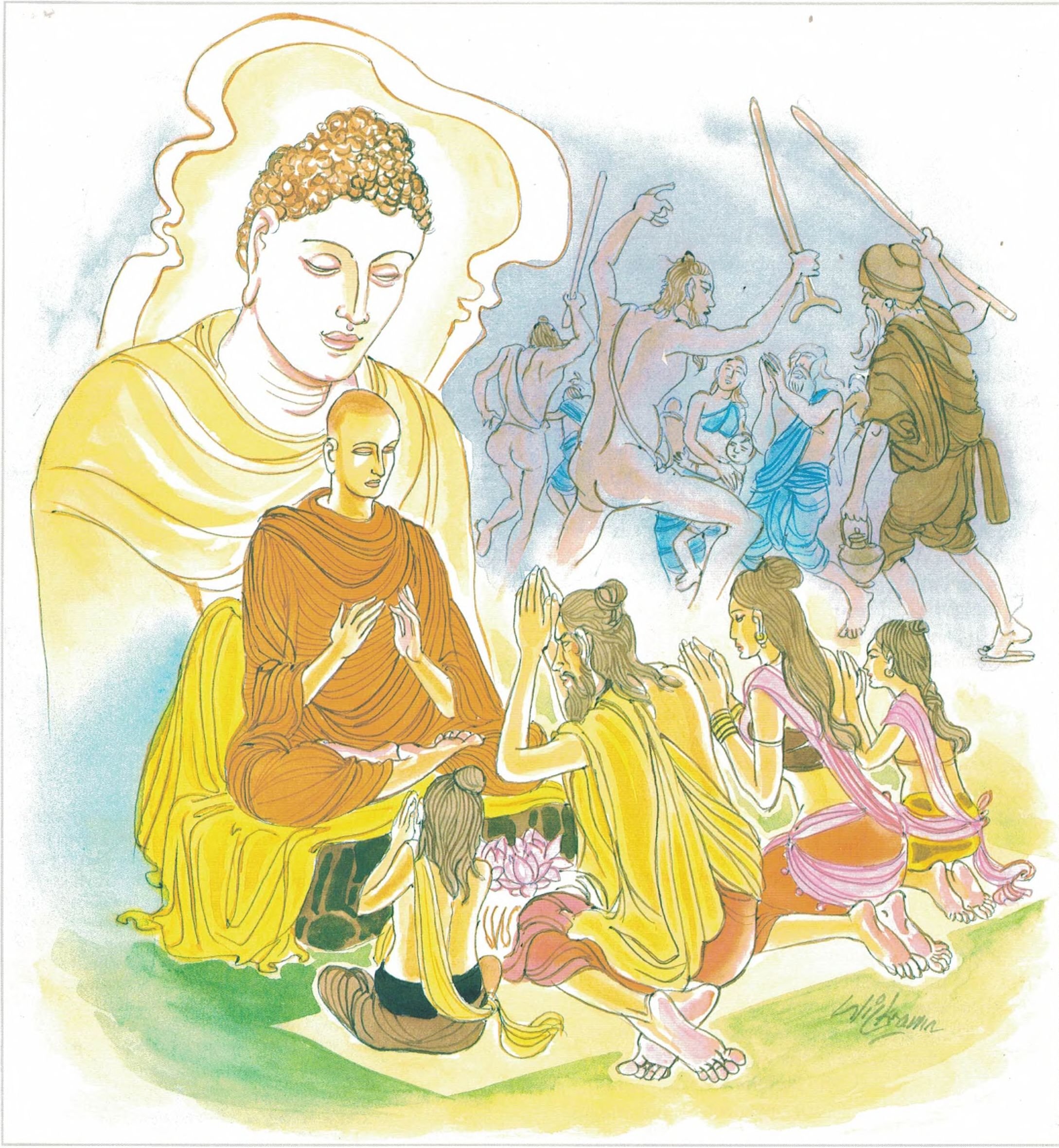Dhammapada (Illustrated)
by Ven. Weagoda Sarada Maha Thero | 1993 | 341,201 words | ISBN-10: 9810049382 | ISBN-13: 9789810049386
This page describes The Story of Santati the Minister which is verse 142 of the English translation of the Dhammapada which forms a part of the Sutta Pitaka of the Buddhist canon of literature. Presenting the fundamental basics of the Buddhist way of life, the Dhammapada is a collection of 423 stanzas. This verse 142 is part of the Daṇḍa Vagga (Punishment) and the moral of the story is “The celibate who’s restrained and is full of love for the entire world is indeed a true bhikkhu”.
Verse 142 - The Story of Santati the Minister
Pali text, illustration and English translation of Dhammapada verse 142:
alaṅkato ce'pi samaṃ careyya |
santo danto niyato brahmacārī |
sabbesu bhūtesu nidhāya daṇḍaṃ |
so brāhmaṇo so samaṇo sa bhikkhu || 142 ||
142. Even though adorned, if living at peace calm, tamed, established in the holy life, for beings all laying force aside: one pure, one peaceful, a bhikkhu is he.
 The celibate who’s restrained and is full of love for the entire world is indeed a true bhikkhu. |
The Story of Santati the Minister
While residing at the Jetavana Monastery, the Buddha spoke this verse, with reference to Santati, the minister of King Pasenadi of Kosala.
On one occasion, Santati the minister returned after suppressing a rebellion on the border. King Pasenadi was so pleased with him that he honoured the minister with the gift of the riches and glory of a ruler together with a dancing girl to entertain him for seven days. On the seventh day, riding the ornamented royal elephant, he went down to the riverside for a bath. On the way, he met the Buddha going on an almsround, and being drunk, he just bowed casually, as a sign of respect to the Buddha. The Buddha smiled, and Ānanda asked the Buddha why he smiled. So, the Buddha said to Ānanda, “Ānanda, this minister will come to see me this very day and after I have given him a short discourse, he will become an arahat. Soon after becoming an arahat he will realize parinibbāna.”
Santati and his party spent the whole day at the riverside, bathing, eating, drinking and thus thoroughly enjoying themselves. In the evening the minister and his party went to the garden to have more drinks and to be entertained by the dancer. The dancer, on her part, tried her best to entertain the minister. For the whole week she was living on reduced diet to keep herself trim. While dancing, she suffered a severe stroke and collapsed, and at that instant she died with her eyes and mouth wide open. The minister was shocked and deeply distressed. In agony, he tried to think of a refuge and remembered the Buddha. He went to the Buddha, accompanied by his followers, and related to him about the grief and anguish he suffered on account of the sudden death of the dancer. He then said to the Buddha, “Venerable! Please help me get over my sorrow; be my refuge, and let me have the peace of mind.” To him the Buddha replied, “Rest assured my son, you have come to One who could help you, One who could be a constant solace to you and who will be your refuge. The tears you have shed due to the death of this dancer throughout the round of rebirths is more than the waters of all the oceans.” The Buddha then instructed the minister in verse. The meaning of the verse is as follows: In the past there has been in you clinging (upādāna) due to craving; get rid of it. In future, do not let such clinging occur in you. Do not also harbour any clinging in the present; by not having any clinging, craving and passion will be calmed in you and you will realize Nibbāna.”
After hearing the verse, the minister attained arahatship. Then, realizing that his life span was at an end, he said to the Buddha, “Venerable! Let me now realize parinibbāna (great demise), for my time has come.” The Buddha consenting, Santati rose to a height of seven toddy-palms into the sky and there, while meditating on the element of fire (tejo kasina), he passed away realizing parinibbāna. His body went up in flames, his blood and flesh burnt up and bone relics (dhātu) fell through the sky and dropped on the clean piece of cloth which was spread by the monks as instructed by the Buddha. The monks asked, “The minister had realized parinibbāna dressed in full regalia; is he a samana or a brahmana?” The Buddha replied, “My son can be called both samana and brahmana.”
Explanatory Translation (Verse 142)
alaṅkato api ce santo danto niyato brahmacārī samaṃ careyya
sabbesu bhūtesu daṇḍaṃ nidhāya so brāhmaṇo so samaṇo sa bhikkhu
alaṅkato api: though a person may be attractively dressed; ce: if; santo [santa]: tranquil; danto [danta]: restrained; niyato [niyata]: of assured liberation; brahmacārī: leading a higher life; samaṃ [sama]: modest; careyya: behaves; sabbesu bhūtesu: towards every being; daṇḍaṃ [daṇḍa]: violence; nidhāya: setting aside (refraining from); so brāhmaṇo [brāhmaṇa]: he is truly a priest; so samaṇo [samaṇa]: he is truly an ascetic; sa bhikkhu: he is truly a mendicant monk
Although a person may be attractively dressed, he behaves in a harmonious manner. He is tranquil, restrained; assured of liberation. He leads the religious life. He is not violent towards beings. Such a person is truly a priest (brāhmaṇa), an ascetic (samana), and a mendicant monk (bhikkhu).
Commentary and exegetical material (Verse 142)
brahma-cariyā: pure (chaste) or holy life, is a term for the life of the monk. Also, a lay-devotee who observes the eight moral precepts and takes as the third precept the vow of chastity upon himself, full abstention from sexual relations. The highest aim and purpose of brahmacariyā is the unshakable deliverance of mind.
